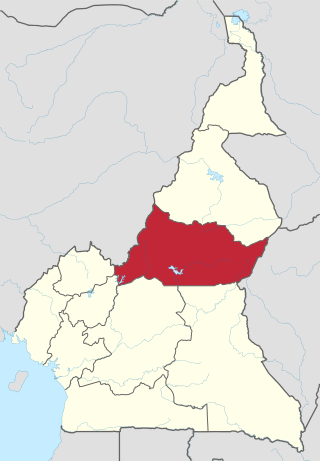Ndop may refer to:
- Ndop, Cameroon, commune in Cameroon
- Ndop (Kuba), figurative sculptures of the Kuba Kingdom
Ndop may refer to:

The Northwest Region, or North-West Region is one of ten regions of Cameroon. Its regional capital is Bamenda. The Northwest Region was part of the Southern Cameroons, found in the western highlands of Cameroon. It is bordered to the southwest by the Southwest Region, to the south by the West Region, to the east by the Adamawa Region, and to the north by Nigeria. Various Ambazonian nationalist and separatist factions regard the region as being distinct as a polity from Cameroon.
Kuba or Quba may refer to:
Babungo or Bamungo may refer to:

The Tikar are a Central African people who inhabit the Adamawa Region and Northwest Region of Cameroon. They are known as great artists, artisans and storytellers. Once a nomadic people, some oral traditions trace the origin of the Tikar people to the Nile River Valley in present-day Sudan. Such ethnic groups were referred to in the 1969 official statistics as "Semi-Bantus" and "Sudanese Negroes." They speak a Northern Bantoid language called Tikar. One of the few African ethnic groups to practice a monotheistic traditional religion, the Tikar refer to God the Creator by the name Nyuy. They also have an extensive spiritual system of ancestral reverence.

The Kuba Kingdom, also known as the Kingdom of the Bakuba or Bushongo, is a traditional kingdom in Central Africa. The Kuba Kingdom flourished between the 17th and 19th centuries in the region bordered by the Sankuru, Lulua, and Kasai rivers in the heart of the modern-day Democratic Republic of the Congo.

Most African sculpture was historically in wood and other organic materials that have not survived from earlier than at most a few centuries ago; older pottery figures are found from a number of areas. Masks are important elements in the art of many peoples, along with human figures, often highly stylized. There is a vast variety of styles, often varying within the same context of origin depending on the use of the object, but wide regional trends are apparent; sculpture is most common among "groups of settled cultivators in the areas drained by the Niger and Congo rivers" in West Africa. Direct images of African deities are relatively infrequent, but masks in particular are or were often made for traditional African religious ceremonies; today many are made for tourists as "airport art". African masks were an influence on European Modernist art, which was inspired by their lack of concern for naturalistic depiction.

Ngo-Ketunjia is a department of Northwest Province in Cameroon. The department covers an area of 1,126 km2 (435 sq mi) and as of 2005 had a total population of 187,348. The capital of the department lies at Ndop.
The Fanji language, Chuufiè (chufieʼ), is a Grassfields Bantu language and the language of the Bafanji people in the Northwest Region of Cameroon. There are approximately 17,000 speakers. The language has a rich system of tonal morphology, including reduplication involving adjectives.
Ndop is a town and a commune in the northwest of Cameroon.
Chamba Leko is one of two languages spoken by the Chamba people, the other being Chamba Daka. It is a member of the Leko branch of Savanna languages, and is spoken across the northern Nigerian–Cameroonian border.
Nyong (Daganyonga), also known as Mubako and Bali-Kumbat, is a Leko language spoken in two well-separated enclaves in Cameroon and Nigeria. Cameroonian speakers consider themselves to be ethnically Chamba.
The Bamunka language, ŊgieməkɔʼkəBamunka pronunciation:[ˈŋgiěꜜmə́ˌkɔ̀ʔkə̌], is a Grassfields Bantu language of Cameroon.

Kuba art comprises a diverse array of media, much of which was created for the courts of chiefs and kings of the Kuba Kingdom. Such work often featured decorations, incorporating cowrie shells and animal skins as symbols of wealth, prestige and power. Masks are also important to the Kuba. They are used both in the rituals of the court and in the initiation of boys into adulthood, as well as at funerals. The Kuba produce embroidered raffia textiles which in the past was made for adornment, woven currency, or as tributary goods for funerals and other seminal occasions. The wealth and power of the court system allowed the Kuba to develop a class of professional artisans who worked primarily for the courts but also produced objects of high quality for other individuals of high status.

Ndop were figurative sculptures representing different kings (nyim) of the Kuba kingdom.

Emil Torday, was a Hungarian anthropologist. He was the father of the romance novelist Ursula Torday.

Bamessing village is one of four villages that make up Ndop central Central Sub Division, and one of thirteen villages of Ngoketunjia division of the North West region of Cameroon. Bamessing is located along the ring road from Bamenda, some 38 km from the town of Bamenda, on the Bamenda-Nkambe stretch of the ring road, just before Bamunka.
Bamali village is one of the four villages that make up Ndop Central sub division and one of the thirteen villages of Ngoketunjia division of the North West region of Cameroon. Bamali village is located partly along the ring road from Bamenda some 40 km away from Bamenda town on the Bamenda-Nkambe stretch of the ring road just before reaching Bamunka.

The Ndop prison break occurred on July 28, 2018, when Ambazonian separatists broke into the Ndop central prison and freed 163 inmates.
This is a timeline of the Anglophone Crisis during 2018.